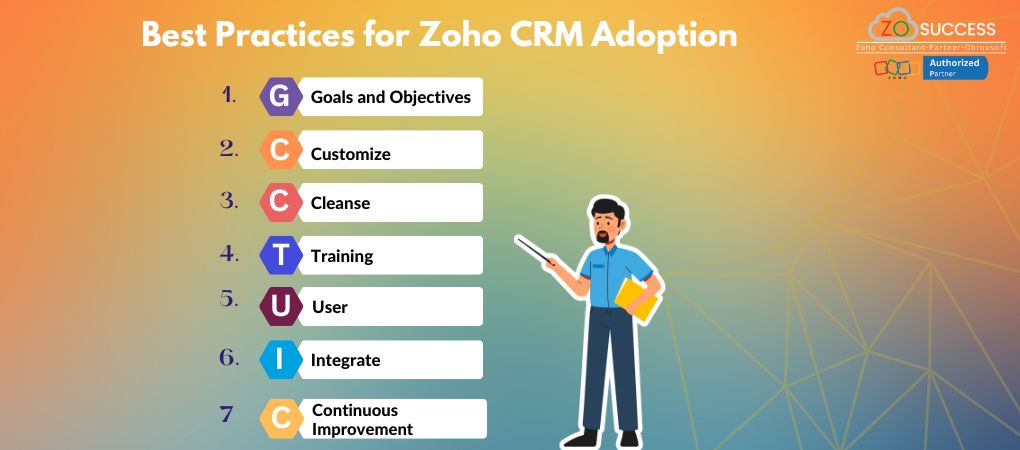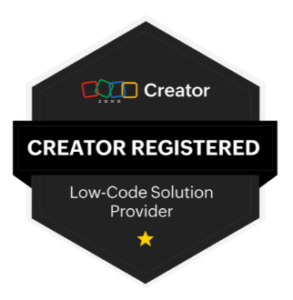This Adoption Guide for Zoho CRM post will help you unlock the Sales Success for your implementation. In the modern business landscape, customer relationship management (CRM) systems have become indispensable tools for organizations seeking to optimize their sales processes and drive business growth. Zoho CRM, a popular cloud-based CRM solution, offers a comprehensive set of features and functionalities designed to streamline sales operations, enhance customer engagement, and boost sales team productivity. In this blog post, we will provide a detailed adoption guide for Zoho CRM, exploring its key features, benefits, and best practices for successful implementation.
About Zoho CRM
Overview of Zoho CRM
Zoho CRM is a powerful cloud-based CRM platform that enables businesses to effectively manage customer relationships, sales pipelines, and marketing campaigns. It offers a wide range of features, including lead management, contact management, sales forecasting, email integration, workflow automation, and analytics. Zoho CRM’s user-friendly interface and scalability make it an ideal solution for businesses of all sizes and industries
Key Features of Zoho CRM
Here are some of the key features of Zoho CRM:
- Lead and Contact Management: Zoho CRM allows businesses to capture, track, and manage leads and contacts effectively. It provides tools to segment and categorize leads, assign tasks to sales representatives, and track the progress of deals through the sales pipeline.
- Sales Automation: Zoho CRM streamlines sales processes with automation capabilities. It enables businesses to automate repetitive tasks, such as data entry, follow-ups, and lead nurturing, freeing up sales teams to focus on building relationships and closing deals.
- Collaboration and Communication: Zoho CRM facilitates collaboration among sales teams and other departments. It provides features like team collaboration, document sharing, and real-time communication, enabling seamless information exchange and improved cross-functional coordination.
- Reporting and Analytics: Zoho CRM offers robust reporting and analytics tools that provide valuable insights into sales performance, lead conversion rates, revenue forecasts, and more. Users can generate custom reports, visualize data through dashboards, and make data-driven decisions to drive sales growth.
Zoho CRM User Adoption
Best Practices for Zoho CRM Adoption
Here are some of the best practices for Zoho CRM user adoption in implementation, which we have gathered based on our experience in hundreds of Zoho CRM implementations we have done at Dhruvsoft / ZoSuccess. Based on our extensive experience we have defined a unique framework – “GCCTUIC” for user adoption in CRM projects.

- Define Goals and Objectives: Clearly articulate your organization’s goals and objectives for implementing Zoho CRM. Identify key metrics and performance indicators that align with your business objectives, such as increasing sales revenue, improving lead conversion rates, or enhancing customer satisfaction.
- Customize for Your Business: Tailor Zoho CRM to meet your specific business needs. Customize fields, layouts, workflows, and automation rules to align with your sales processes. Map out your sales pipeline stages and configure Zoho CRM accordingly to reflect your unique sales funnel.
- Cleanse and Import Data: Before importing data into Zoho CRM, ensure that it is clean and organized. Remove duplicate or outdated records, standardize data formats, and validate data accuracy. Use Zoho CRM’s data import tools to efficiently migrate your existing customer data.
- Provide Comprehensive Training: Invest in comprehensive training for your sales team to ensure the smooth adoption of Zoho CRM. Train them on navigating the system, entering data, managing leads and contacts, utilizing automation features, and leveraging reporting and analytics capabilities. Continuously provide ongoing training and support as needed.
- Foster User Adoption: Encourage your sales team to embrace Zoho CRM by highlighting its benefits and how it can simplify their workflows and boost their productivity. Set clear expectations for CRM usage and encourage regular data entry and updates. Recognize and reward users who actively utilize the system and contribute to its success
- Integrate with Existing Systems: Evaluate and integrate Zoho CRM with other systems and tools your organization uses, such as email marketing platforms, customer support software, or accounting systems. Seamless integration enables data synchronization, improves process efficiency, and enhances the overall customer experience.
- Continuously Monitor and Refine: Regularly monitor and analyze your CRM data to identify trends, areas for improvement, and opportunities for sales growth. Solicit feedback from users to understand pain points and areas where the system can be optimized. Continuously refine your Zoho CRM implementation to align with evolving business needs and changing market dynamics.
Benefits of Zoho CRM Adoption
Here are some of the key benefits of using these adoption techniques successfully while implementing Zoho CRM in your organization:
- Improved Sales Efficiency: Zoho CRM streamlines sales processes, automates tasks, and provides a centralized hub for managing customer interactions. This leads to increased sales efficiency, reduced administrative burden, and improved time management for sales teams.
- Enhanced Customer Engagement: With Zoho CRM, businesses can effectively track and manage customer interactions, resulting in improved customer engagement. Sales representatives have access to a comprehensive customer history, enabling them to provide personalized and timely communication, address customer needs, and build stronger relationships.
- Data-Driven Decision Making: Zoho CRM’s robust reporting and analytics capabilities empower organizations to make data-driven decisions. By analyzing sales performance, lead conversion rates, and customer behavior, businesses can identify trends, assess the effectiveness of sales strategies, and optimize their sales processes for better results.
Conclusion
Adopting Zoho CRM can be a game-changer for businesses aiming to streamline their sales processes, enhance customer relationships, and drive revenue growth. By leveraging its key features, adhering to best practices, and fostering user adoption, organizations can unlock the full potential of Zoho CRM and achieve sales success. Remember to define clear goals, customize the system to align with your unique needs, provide comprehensive training, and continuously refine your implementation to stay ahead in the competitive marketplace. With Zoho CRM as your sales ally, your organization can thrive and achieve remarkable sales performance.
Contact our team of Zoho CRM experts to know more about our GCCTUIC Framework for User adoption in CRM Projects.


 “ZOSuccess” is the Zoho Consulting Practice of Dhruvsoft Services Private Limited – a leading Zoho Advanced Partner from India – providing services worldwide …
“ZOSuccess” is the Zoho Consulting Practice of Dhruvsoft Services Private Limited – a leading Zoho Advanced Partner from India – providing services worldwide …